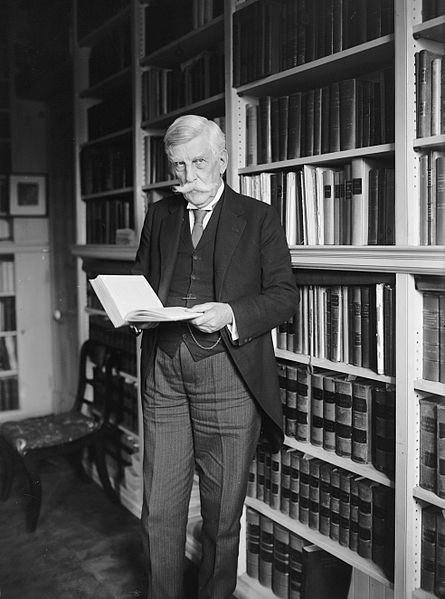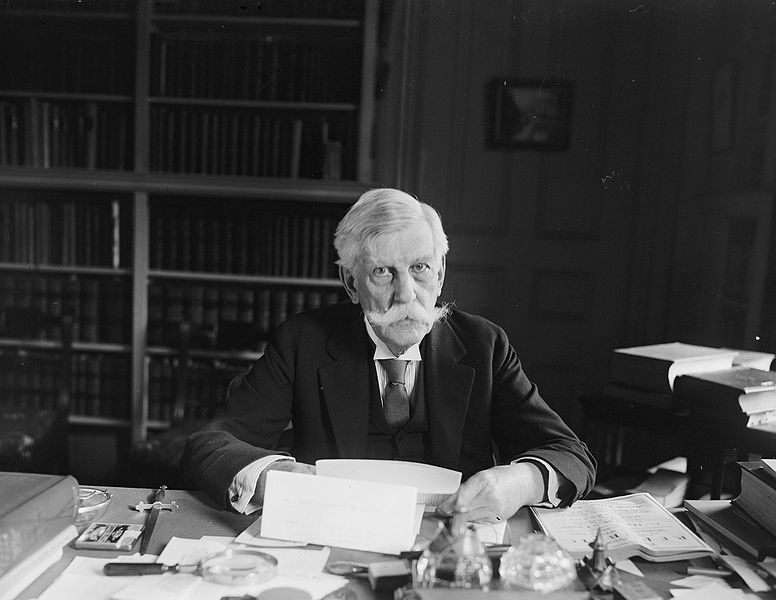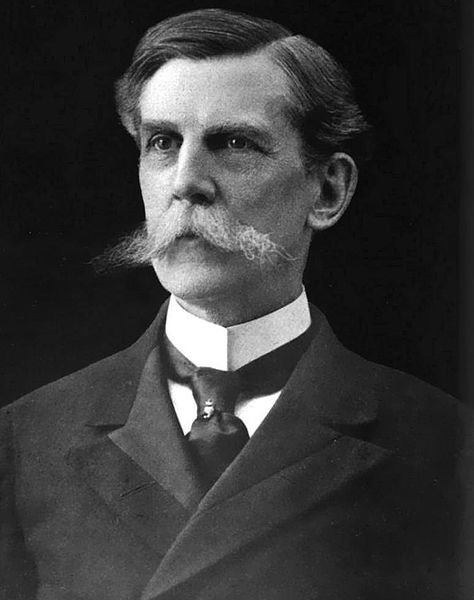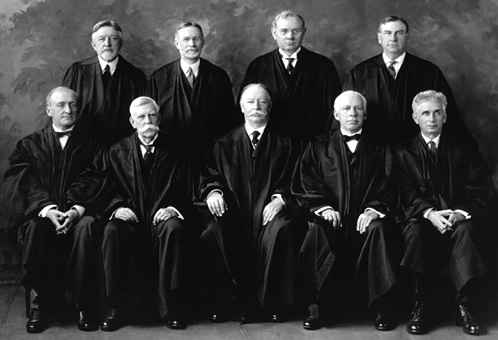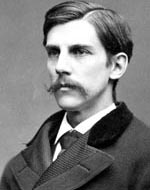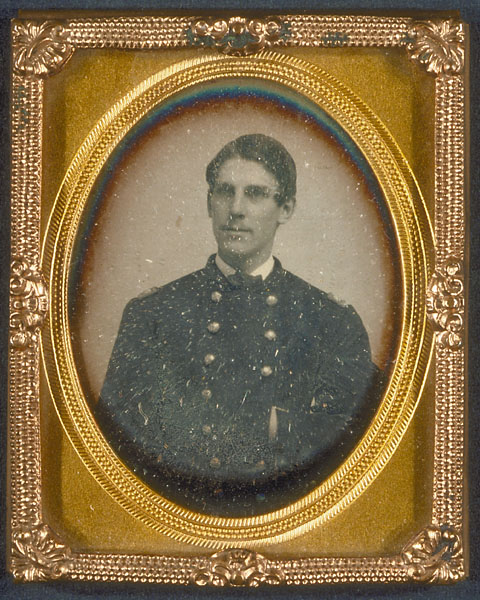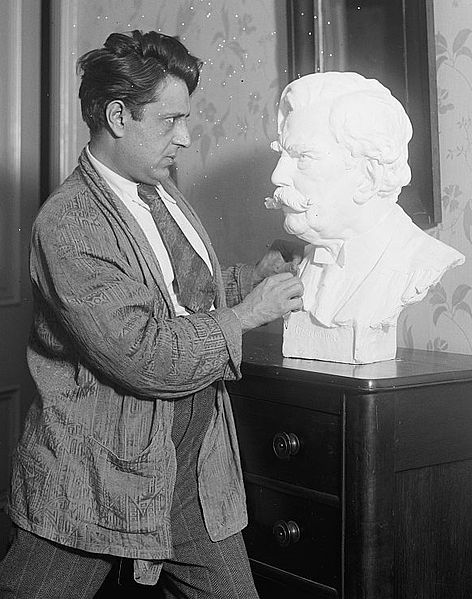<Back to Index>
- Petroleum Pioneer Jan Józef Ignacy Łukasiewicz, 1822
- Composer Carl Philipp Emanuel Bach, 1714
- Associate Justice of the Supreme Court Oliver Wendell Holmes, Jr., 1841
PAGE SPONSOR
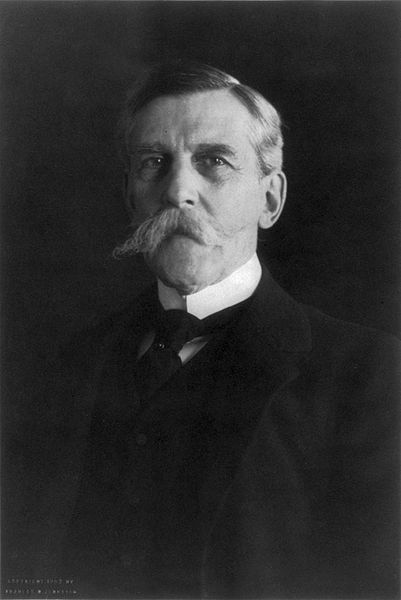
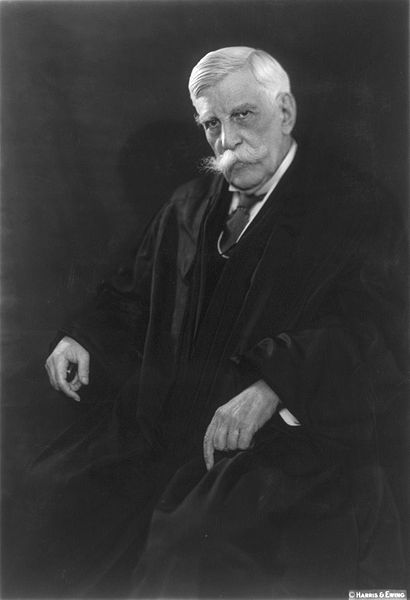
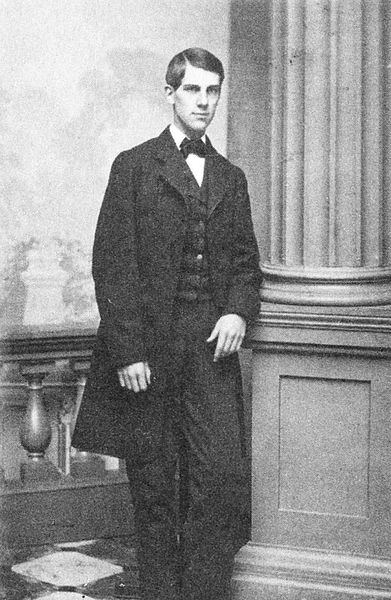
Oliver Wendell Holmes, Jr. (March 8, 1841 – March 6, 1935) was an American jurist who served as an Associate Justice of the Supreme Court of the United States from 1902 to 1932. Noted for his long service, his concise and pithy opinions, and his deference to the decisions of elected legislatures, he is one of the most widely cited United States Supreme Court justices in history, particularly for his "clear and present danger" majority opinion in the 1919 case of Schenck v. United States, and is one of the most influential American common law judges. Holmes retired from the Court at the age of 90, making him the oldest Justice in the Supreme Court's history. He also served as an Associate Justice and as Chief Justice on the Massachusetts Supreme Judicial Court, and was Weld Professor of Law at the Harvard Law School, of which he was an alumnus.
Profoundly influenced by his experience fighting in the American Civil War, Holmes helped move American legal thinking away from formalism and towards legal realism, as summed up in his maxim: "The life of the law has not been logic; it has been experience." Holmes espoused a form of moral skepticism and opposed the doctrine of natural law, marking a significant shift in American jurisprudence. As he wrote in one of his most famous decisions, his dissent in Abrams v. United States (1919), he regarded the United States Constitution as "an experiment, as all life is an experiment" and believed that as a consequence "we should be eternally vigilant against attempts to check the expression of opinions that we loathe and believe to be fraught with death." During his tenure on the Supreme Court, to which he was appointed by President Theodore Roosevelt, he supported efforts for economic regulation and advocated broad freedom of speech under the First Amendment. These positions as well as his distinctive personality and writing style made him a popular figure, especially with American progressives, despite his deep cynicism and disagreement with their politics. His jurisprudence influenced much subsequent American legal thinking, including judicial consensus supporting New Dealregulatory law, pragmatism, critical legal studies, and law and economics. The Journal of Legal Studies has identified Holmes as one of the three most cited American legal scholars of the 20th century.
Holmes was born in
Boston, Massachusetts, the son of the prominent writer and physician Oliver Wendell Holmes, Sr. and abolitionist Amelia
Lee Jackson. As a young man, Holmes loved literature and supported the
abolitionist movement that thrived in Boston society during the 1850s.
He graduated from Harvard University in 1861, where he was elected to the Phi Beta Kappa honor society and was a brother of the Alpha Delta Phi. Additionally, Holmes was a member of the Porcellian Club, an exclusive organization, during his senior year at Harvard.
After the war's conclusion, Holmes returned to Harvard to study law. He was admitted to the bar in 1866, and went into practice in Boston. He joined a small firm, and married a childhood friend, Fanny Bowditch Dixwell. Their marriage lasted until her death on April 30, 1929. They never had children together. They did adopt and raise an orphaned cousin, Dorothy Upham. Mrs. Holmes was described as devoted, witty, wise, tactful, and perceptive.
Whenever he could, Holmes visited London during the social season of spring and summer. He formed his closest friendships with men and women there, and became one of the founders of what was soon called the "sociological" school of jurisprudence in Great Britain, which would be followed a generation later by the "legal realist" school in America.
Holmes practiced admiralty law and commercial law in Boston for fifteen years. In 1870, Holmes became an editor of the American Law Review, edited a new edition of Kent's Commentaries on American Law in 1873, and published numerous articles on the common law. In 1881, he published the first edition of his well regarded book The Common Law, in which he summarized the views developed in the preceding years. In the book, Holmes sets forth his view that the only source of law, properly speaking, is a judicial decision. Judges decide cases on the facts, and then write opinions afterward presenting a rationale for their decision. The true basis of the decision is often an "inarticulate major premise" outside the law. A judge is obliged to choose between contending legal theories, and the true basis of his decision is necessarily drawn from outside the law. These views endeared Holmes to the later advocates of legal realism and made him one of the early founders of law and economics jurisprudence.
Holmes was considered for a federal court judgeship in 1878 by President Rutherford B. Hayes, but Massachusetts Senator George Frisbie Hoar convinced Hayes to nominate another candidate. In the fall of 1882, Holmes became a professor at Harvard Law School. On Friday 8 December 1882, Supreme Judicial Court of Massachusetts associate justice Otis Lord decided to resign, giving outgoing Republican governor John Davis Long a chance to appoint his successor, if it could be done before the Massachusetts Governor's Council adjourned at 3pm. Holmes quickly agreed, and there being no objection by the Council, took the oath of office on 15 December 1882. His resignation was accepted effective that day by the law school. On 2 August 1899, Holmes became Chief Justice of the Massachusetts Supreme Judicial Court following the death of Walbridge A. Field.
During
his service on the Massachusetts court, Holmes continued to develop and
apply his views of the common law, usually following precedent
faithfully. He issued few constitutional opinions in these years, but
carefully developed the principles of free expression as a common law
doctrine. He departed from precedent to recognize workers' right to
organize trade unions as long as no violence or coercion was
involved, stating in his opinions that fundamental fairness required
that workers be allowed to combine to compete on an equal footing with
employers. On August 11, 1902, Holmes received a recess appointment from President Theodore Roosevelt naming Holmes to a seat on the United States Supreme Court vacated by Justice Horace Gray, who had retired in July 1902 as a result of illness. The appointment was made on the recommendation of Senator Henry Cabot Lodge (Roosevelt
reportedly admired Holmes's "Soldier's Faith" speech as well). Holmes'
appointment has been referred to as one of the few Supreme Court
appointments in history not motivated by partisanship or politics, but
strictly based on the nominee's contribution to law. Formally nominated on December 2, 1902, Holmes was unanimously confirmed by the United States Senate on
December 4, receiving his commission the same day. According to some
accounts, Holmes assured Roosevelt that he would vote to sustain the
administration's position that not all the provisions of the United States Constitution applied
to possessions acquired from Spain, an important question on which the
Court was then evenly divided. On the bench, Holmes did vote to support
the administration's position in the "Insular Cases." However, he later disappointed Roosevelt by dissenting in Northern Securities Co. v. United States, a major antitrust prosecution; the
majority of the court, however, did rule against Holmes and sided with
Theodore Roosevelt's belief that Northern Securities violated the
Sherman Anti - Trust Act. This action by Holmes brought his relationship with Theodore Roosevelt to an abrupt halt.
Holmes
was known for his pithy, short, and frequently quoted opinions. In more
than thirty years on the Supreme Court bench, he ruled on cases
spanning the whole range of federal law. He is remembered for prescient
opinions on topics as widely separated as copyright, the law of
contempt, the antitrust status of professional baseball, and the oath
required for
citizenship. Holmes, like most of his contemporaries, viewed the Bill of Rights as
codifying privileges obtained over the centuries in English and
American law. Beginning with his first opinion for the Court, in Otis v. Parker, Holmes declared that "due process of law,"
the fundamental principle of fairness, protected people from
unreasonable legislation, but was limited to only those fundamental
principles enshrined in the common law and did not protect most
economic interests. In a series of opinions surrounding the WWI Espionage Act and Sedition Act,
he held that the freedom of expression guaranteed by federal and state
constitutions simply declared a common - law privilege to do harm, except
in cases where the expression, in the circumstances in which it was
uttered, posed a "clear and present danger" of causing some harm that
the legislature had properly forbidden. In Schenck v. United States,
Holmes announced this doctrine for a unanimous Court, famously
declaring that the First Amendment would not protect a person "falsely
shouting fire in a theatre and causing a panic." The following year, however, in Abrams v. United States, Holmes — influenced by Zechariah Chafee's article "Freedom of Speech in War Time" —
delivered a strongly worded dissent in which he criticized the
majority's use of the clear and present danger test, arguing that
protests by political dissidents posed no actual risk of interfering
with war effort. In his dissent, he accused the Court of punishing the
defendants for their opinions rather than their acts. Although Holmes
evidently believed that he was adhering to his own precedent, many
later commentators accused Holmes of inconsistency, even of seeking to
carry favor with his young admirers. The Supreme Court departed from
his views where the validity of a statute was in question, adopting the
principle that a legislature could properly declare that some forms of
speech posed a clear and present danger, regardless of the
circumstances in which they were uttered. From
Taft's departure on February 3, 1930 until Hughes took office on
February 24, 1930, Holmes was briefly Acting Chief Justice under 36
Stat. 1152. By the time Holmes was 80, he had dissented in so many opinions that he became known as "The Great Dissenter," a title which has been carried through the years to refer to various U.S. Supreme Court justices, including Justice John Marshall Harlan, with the latest being Justice William Brennan.
In 1927, Holmes wrote the majority opinion in the
Buck v. Bell case that upheld the forced sterilization of
a woman who was claimed to be of below average intelligence. In support
of his argument that the interest of the states in a "pure" gene pool
outweighed the interest of individuals in their bodily integrity, he
argued: Holmes concluded his argument by declaring that "Three generations of imbeciles are enough".
Justice
Holmes laid the foundation of healthy and constructive scepticism in
the law. Hughes writes: "Though another half century was to elapse
before the appearance of Ogden and Richard's
The Meaning of Meaning, exploration of meaning of meaning of law was Holmes's pioneer enterprise." Hughes further writes: "To me, Mr. Justice Holmes is a prophet of the Law." In 1881, Holmes published The Common Law,
representing a new departure in legal philosophy. By his writings, he
changed attitude to law. An excerpt from the opening passage captures
the pragmatic theme of that work and of Holmes's philosophy of law:
'The life of the law has not been logic; it has been experience.' In a dissenting opinion in Lochner v. New York (1905) Holmes
declared that the law should develop along with society and that the
14th Amendment did not deny states a right to experiment with social
legislation. He also argued for judicial restraint, asserting that the
Court should not interpret the Constitution according to its own social
philosophy. Francis Biddle writes:
"He was convinced that one who administers constitutional law should
multiply his skepticisms to avoid heading into vague words like
'liberty', and reading into law his private convictions or the
prejudices of his class." Biddle
also tells us that Holmes "refused to let his preferences (other men
were apt to call them convictions) interfere with his judicial
decisions…… The steadily held determination to keep his own views
isolated from his professional work is aptly shown by his famous remark
in the Lochner case - the Fourteenth Amendment does not enact Mr. Herbert Spencer's Social Statics.... A constitution is not intended to embody a particular economic theory." According
to Holmes, 'men make their own laws;... these laws do not flow from
some mysterious omnipresence in the sky, and ... judges are not
independent mouthpieces of the infinite., 'The common law is not a brooding omnipresence in the sky. Holmes
compared the Law to a bad man "who cares only for the material
consequences of things" rather than as an independent moral entity. Holmes
defined the law in accordance with his pragmatic judicial philosophy.
Rather than a set of abstract, rational, mathematical, or in any way
unwordly set of principals, Holmes said that '[t]he prophecies of what
the courts will do in fact, and nothing more pretentious, are what I
mean by the law. Accordingly,
Holmes thought that only a judge or lawyer who is acquainted with the
historical, social, and economic aspects of the law will be in a
position to fulfill his functions properly. As
a justice of US Supreme Court, Holmes introduced a new method of
constitutional interpretation. He challenged the traditional concept of
constitution. Holmes
also protested against the method of abstract logical deduction from
general rules in the judicial process. According to Holmes, lawyers and
judges are not logicians and mathematicians. The books of the laws are
not books of logic and mathematics. He writes: "The life of the law has
not been logic; it has been experience. The felt necessities of the
time, the prevalent moral and political theories, intuitions of public
policy, avowed or unconscious, and even the prejudices which judges
share with their fellow men, have had a good deal more to do than
syllogism in determining the rules by which men should be governed. The
law embodies the story of a nation's development through many
centuries, and it cannot be dealt with as if it contained only the axioms and corollaries of a book of mathematics. In Lochner v. New York (1905) he observes that, 'General proposition do not decide concrete cases.
Holmes, also insisted on the separation of 'ought' and 'is' which are obstacles in understanding the realities of the law. As
a moral sceptic, Holmes tells us that if you want to know the real law,
and nothing else, you must consider it from the point of view of 'bad
man' who cares only from material consequences of the courts'
decisions, and not from the point of view of good man, who find his
reasons for conduct "in the vaguer sanctions of his conscience. The
law is full of phraseology drawn from morals, and talks about rights
and duties, malice, intent, and negligence - and nothing is easier in
legal reasoning than to take these words in their moral sense. Holmes
said: "I think our morally tinted words have caused a great deal of
confused thinking." But Holmes is not unconcerned with moral question.
He writes: "The law is the witness and external deposit of our moral
life. Its history is the history of the moral development of the race.
The practice of it, in spite of popular jests, tends to make good
citizens and good men. When I emphasize the difference between law and
morals I do so with reference to a single end, that of learning and
understanding the law. George Washington University law professor Jeffrey Rosen summarized
Holmes' views on politics and the law this way: "Holmes was a cold and
brutally cynical man who had contempt for the masses and for the
progressive laws he voted to uphold."
Holmes
served on the court until January 12, 1932, when his brethren on the
court, citing his advanced age, suggested that the time had come for
him to step down. By that time, at 90 years of age, he was the oldest
justice to serve in the court's history. Three years later, Holmes died
of
pneumonia in Washington, D.C. in
1935, two days short of his 94th birthday. In his will, Holmes left his
residuary estate to the United States government (he had earlier said
that "Taxes are what we pay for civilized society" in Compañia General De Tabacos De Filipinas vs. Collector of Internal Revenue, 275 U.S. 87, 100 (1927).)
After his death, his personal effects included his Civil War Officer's
uniform still stained with his blood and 'torn with shot' as well as
the carefully wrapped Minié balls that had wounded him three times in separate battles. He was buried in Arlington National Cemetery. The United States Postal Service honored Holmes with a Prominent Americans series (1965 – 1978) 15¢ postage stamp. Holmes's papers, donated to Harvard Law School,
were kept closed for many years after his death, a circumstance that
gave rise to numerous speculative and fictionalized accounts of his
life. Catherine Drinker Bowen's fictionalized biography "Yankee from Olympus" was a long time bestseller, and the 1951 Hollywood motion picture The Magnificent Yankee was based on a highly fictionalized play about
Holmes's life. Since the opening of the extensive Holmes papers in the
1980s, however, there has been a series of more accurate biographies
and scholarly monographs. Harvard Medical School names one of its five student societies after his father, Doctor Oliver Wendell Holmes. American actor Louis Calhern portrayed Holmes in the 1946 play The Magnificent Yankee, with Dorothy Gish as Holmes's wife, and in 1950, Calhern repeated his performance in MGM's film version, for which he received his only Academy Award nomination. Ann Harding co-starred in the film. A 1965 television adaptation of the play starred Alfred Lunt and Lynn Fontanne in one of their few appearances on the small screen. Holmes is featured in the following passage by Isaac Asimov: Holmes,
in his last years, was walking down Pennsylvania Avenue with a friend,
when a pretty girl passed. Holmes turned to look after her. Having done
so, he sighed and said to his friend, "Ah, George, what wouldn't I give
to be seventy - five again?" His quote is shown on the wall in the school in the Gus Van Sant film Elephant. In the movie Judgment at Nuremberg (1961), defense advocate Hans Rolfe quotes Justice Oliver Wendell Holmes twice with the following: This
responsibility will not be found only in documents that no one contests
or denies. It will be found in considerations of a political or social
nature. It will be found, most of all in the character of men. Holmes appears as the principle character in the Bangsian Fantasy story "With Enemies Like These" in the volume Lawyers in hell, part of the Heroes in Hell shared universe series.
“ We
have seen more than once that the public welfare may call upon the best
citizens for their lives. It would be strange if it could not call upon
those who already sap the strength of the State for these lesser
sacrifices, often not felt to be such by those concerned, to prevent
our being swamped with incompetence. It is better for all the world, if
instead of waiting to execute degenerate offspring for crime, or to let
them starve for their imbecility, society can prevent those who are
manifestly unfit from continuing their kind. The principle that
sustains compulsory vaccination is broad enough to cover cutting the
Fallopian tubes. ”
